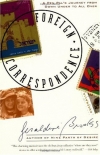Foreign Correspondence: A Pen Pal's Journey by Geraldine Brooks (finding audrey .TXT) 📗

- Author: Geraldine Brooks
Book online «Foreign Correspondence: A Pen Pal's Journey by Geraldine Brooks (finding audrey .TXT) 📗». Author Geraldine Brooks
That afternoon we filled yawning gaps in my knowledge of the family, driving stakes through the heart of my fevered adolescent fantasies. Joannie’s parents were CIO, not CIA: they met at a Congress of Industrial Organizations conference. Before her marriage, Elizabeth worked for John L. Lewis, the legendary trade unionist and CIO leader. Later she taught poetry and became chair of a state college English department. Joannie’s father was an English professor. They were in Austria as Fulbrights, not spies. Joannie’s left-wing views were part of the family consensus, not a source of friction.
According to Elizabeth, Joannie’s conflicts with her father were of the common or garden variety: he was demanding, especially academically—“it was a real blot on the escutcheon to get a low grade”—and he was puritanical about relations with the opposite sex. These areas of friction were exacerbated by his day-to-day distance. Forty-six years old when Joannie was born, he was preoccupied with his teaching and research. So Joannie lived mostly in her mother’s orbit, a close relationship that sounded just like the one I’d had with my mother.
Joannie’s father had died earlier that year. If I had left it any longer to write, I would not have found Elizabeth in Maplewood. The house was for sale, and she planned to move to a retirement community in another state. She had started the chore of packing up a lifetime’s memories. “It’s so hard to throw anything away,” she said. Especially anything of Joannie’s.
I had an evening plane to catch from Newark airport. I was on the steps, heading for my cab, when Elizabeth disappeared into the kitchen and returned with an apple. “In case you get hungry on the plane,” she said, tucking it in the pocket of my coat. It was exactly the kind of thing my mother would do.
The Martha’s Vineyard house “has a kitchen, a living room, a dining room, a bedroom, a study with a bed in it, plus couches in various places that convert to beds,” Joannie wrote in 1972. It had been built a hundred years earlier as a fisherman’s cottage. Her uncle had bought it as a writer’s retreat. His books still lined the walls of the cabin—faded hardbacks titled Mission to Moscow by Joseph E. Davies or The Un-Americans by Frank J. Donne. Because he used the small barn by the house as a place to produce a left-wing magazine, the knoll on which it sat, just behind Dutcher Dock, had become known locally as Socialist Hill. Joannie’s father inherited the property on his brother’s death in 1968. Now, with the surrounding cottages rented out for ten thousand dollars a month to summer vacationers, the name “Socialist Hill” is one of those local oddities inscrutable to all but old-timers.
Over the years, the winding track up from the port has carved its way closer and closer to the house, until the tiny front porch almost seems to topple into the roadway. When Joannie’s mother rises from her rocking chair to greet me, her white hair almost brushes the low porch ceiling. At eighty, she is tall and straight as a poplar.
When I visit Elizabeth on Martha’s Vineyard, there is always a fresh-baked pie cooling on the counter of the cabin’s tiny, dollhouse kitchen. Something wholesome and good—fresh-picked corn or new potatoes, the local farmer’s broccoli or ruby-red tomatoes—waits to be prepared for dinner.
Elizabeth vividly remembers when Joannie became picky about such meals. “She had a friend staying with her that summer and they marched into the kitchen together one day and announced they were going to go on a diet,” she says. “I laughed. Everyone was going on a diet at that time.”
We take our coffee out into the neat little garden between the house and the cabin. Bright-faced cosmos bob in the breeze; Elizabeth made a special trip in June to plant annuals so that the garden would bloom through the month of August, when the family comes. All the children visit—Jack, the onetime conscientious objector, now an electrical engineer in Santa Fe; Jamie, Joannie’s older sister from Berkeley, who takes pictures and works on archeological digs; Joel, the biochemist, a cancer researcher in Buffalo. And now, as August draws to a close, I have come, with my husband and new baby. We bathe him on the kitchen table in an old plastic tub that has seen service as baby bath for Elizabeth’s grandchildren. And at night, sleeping in the cabin where Joannie should be sleeping, I’m overwhelmed again with the feeling that I am having her life.
Sitting in banana chairs as our damp swimsuits flap on the clothesline, Elizabeth explains one of Joannie’s failed attempts to get her own apartment in Boston while she went to university there. “She was going to BU, at the time,” is what Elizabeth says. But what I hear is: “She was going to be you, at the time.” She was going to be me, at the time—content in my little flat in Glebe, Sydney, heading happily toward career, marriage, family.
But, of course, she wasn’t going to be me at all.
When Joannie returned to Maplewood with her parents in the fall of 1972, it took three months for anyone to acknowledge that the summer diet had gone too far. “I noticed she was eating less, but she was also wearing loose clothes, so I hadn’t realized the extent of it,” Elizabeth says. “I had been concerned that she seemed to be withdrawing again.”
As a child and young teenager, Joannie had been painfully shy. For Halloween, she would dress up as Mr. Spock. “In the costume—with the pointed ears and so on—she looked just like him. But even without it, she was so perfect at imitating him, it concerned me—that affectless expression—it seemed part of





Comments (0)